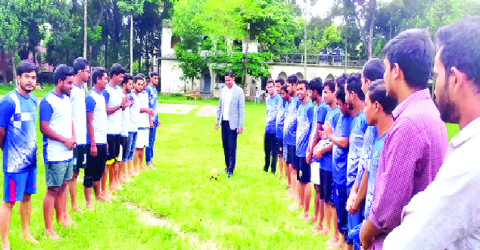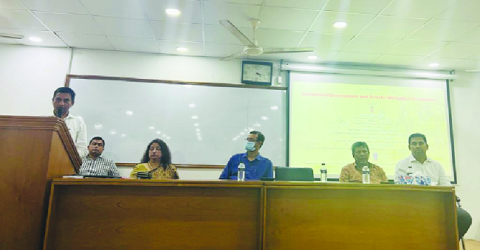
Professor Dr M Amjad Hossain greets Minister for Education Dr Dipu Moni on the campus of Amena Baki Residential School and College that she visited a few months ago. File photo
Z A M Khairuzaman : Bangladesh has achieved significant social progress in recent times. But child marriage rates remain stubbornly high here despite concerted action taken by the government and civil society across a range of sectors. Poverty is not the only contributing factor, it is one of the most powerful drivers of the the high prevalence of child marriage in the country. Half of Bangladeshi girls are being married before the age of 18 years. Child marriage robs girls of their childhood and seriously limits their life options. It lowers their education levels and increases the risks of adolescent pregnancy and violence. It also results in the intergenerational transmission of poverty. Early marriage and pregnancy inhibit the further growth of adolescent girls. They become “small mothers” who in turn give birth to underweight babies. Small babies grow up to be small girls and underdeveloped adolescents, and the vicious cycle starts again. While the practice of child marriage has slowly decreased in the country over the past few decades, it remains unacceptably high nationally with more married children in rural areas and urban slums and particularly among poor and less educated. Not only girls, the practice of child marriage also appears most common among boys living in the poorest households and in rural areas, and with no education or only primary schooling.However, the percentage of women aged 20-24 who were married before age 18 has declined, but the decline is small and the social norms enabling child marriage continue to be persistent.
According to a report published in Dhaka-based Daily Sun recently, Bangladesh witnessed 47,414 child marriages in 2021.The findings came up in the report prepared by the Monitoring and Evaluation Wing of the Directorate of Secondary and Higher Education. As per the report, at least 77,706 students got involved in child labour during the period. Earlier, the gender justice and diversity department of BRAC found that child marriage increased by 13 percent when it conducted a survey to access the impact of the Covid-19 pandemic on women and adolescents in the country’s 11 districts in 2020.
In our country, some legislative efforts have been made to combat child marriage in recent years. But, stronger enforcement of national child marriage and protection laws, as well as birth registration are a must to attain success. A UNICEF report calls for accelerated action to end child marriage in Bangladesh by 2030. Ending child marriage is a priority for both the Government of Bangladesh and UNICEF. However, to achieve the Sustainable Development Goal (SDG) target to end child marriage by 2030, and the national target to end child marriage by 2041, Bangladesh requires more efforts to bring change. Progress must be at least 8 times faster than the rate of the past decade to meet the national target, and 17 times faster to meet the SDG target.
Together all concerned must challenge harmful norms and end child marriage. This human rights violation has devastating consequences for individuals and societies, robbing children of their childhoods and limiting their life choices. Not only the government, but the conscious section of society must invest to secure children’s right to life and education, and reduce their exposure to violence and exploitation. Access to schools is a crucial factor in children remaining in education. But many of the world’s poorest children continue to be denied this basic human right. Bangladesh is not an exception.
At the most basic level, building more schools in rural areas makes it easier to access education. From this realisation, an enthusiastic social worker, Professor Dr M Amjad Hossain, also a prominent Arthroplasty and Trauma Surgeon, founded Amena Baki Residential Model School at Chirirbandar, an underdeveloped upazila in Dinajpur district, back in 2001. Later, it was extended by attaching a college section. Co-education exists in this rural institution, a project under his AB Foundation that works for eradication of poverty.
During its founding, teachers and students have pledged under guidance of the philanthropic freedom fighter to eradicate child trafficking, child labour, and child marriage right at its source along with addressing other cross-cutting issues of education, water, sanitation, hygiene and livelihood. In the school, children first learn to exercise their latent power and make their voices heard. Alongside spreading the light of education among underprivileged rural boys and girls, the institution strongly upheld children’s causes. It relentlessly fights against child marriage and child labour as well as other social ills. The school envisions a world free of violence against children and works on an array of issues that affect vulnerable children and their families.
As per directive of the school founder, parents’ meetings are organised at the auditorium. where they discuss about the perils of child marriage besides routine activities. At such a meeting, a student was given permission following her request to speak. She recounted how her parents had been furious when she declined to get married and instead stayed in school – “but now they are very proud of me,” she said.”I made a huge mistake marrying off my girls,” a parent of another girl said of his first four daughters. “But now I have learned to rectify from Amjad Sir’s school.”
Before leaving the meeting, the principal asked each parent to sign a promise to keep their daughters in school at least until graduation. “We want parents to understand that their daughters’ rights are protected”, said the principal. “And even though our bond isn’t legal tender, in many ways it morally binds them.”
While lack of hygiene and sanitation affects all school-aged children, inadequate facilities are most detrimental to girls. Many schools have unsafe latrines or unsanitary water supplies, making it impossible for girls to remain in school when they begin to menstruate. The shortage of safe, separate and private sanitation and washing facilities is one of the leading factors preventing girls from attending school. But all the facilities are available in this school built by the prominent orthopedic surgeon, who was awarded the prestigious Swadhinata Padak (Independence Award) in 2021 in recognition to his extraordinary contributions in social work.
Thanks to the rural school for its fight against child marriage. Once backward, Chirirbandar is now a changed upazila and Dr Amjad has emerged as the catayst for the change. Hearing the path-breaking concept of the prolific social worker, Dr Dipu Moni, the Minister for Education, visited the Amena-Baki Residential Model School and College a few months ago. During her visit, she termed the vicinity of the educational institute as an education city which is rare in the history of Bangladesh.
The writer is a columnist. E-mail: [email protected]




